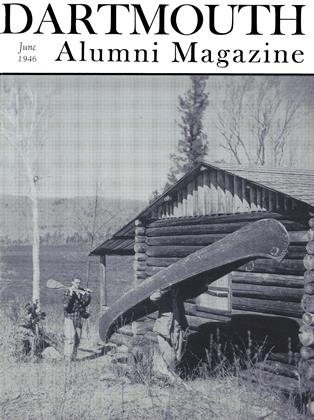A PERSONAL TRIBUTE TO THE LATE JUDGE NELSON PIERCE BROWN '99
IT WAS WITH SENSE OF SHOCK second only to my acute sense of loss that on April 9th I received word of Nelson Brown's sudden death from coronary thrombosis. The sole comfort was that he had died as he would have wished to do, fulfilling the vitally important responsibilities of his office until the last possible moment and without necessity of undergoing a long interval of illness. Thus passed from the inner circle of my intimate friendships one for whom decades ago I had acquired admiration and affection which through the years had constantly grown.
His was the competence of a man whose humility of character was maintained without loss of self-confidence; who possessed the common touch with all types of mankind without any impairment of the culture and refinement which were instinctively his; whose respect for the sacredness of the trust inherent in his office and whose insistence upon recognition being given to this were maintained without the slightest inclination towards self-importance.
He had the respect for his profession and the pride in it vital to any man who is to find the rich satisfactions in life which were his. He believed in law as the basis of a civilized society and he believed no less in the necessity that individuals be held to observance of the law. He held that the part of intelligence among a civilized people was to change a law if it was bad, not to ignore it. Moreover within the field of law his own particular responsibilities were those wherein his greatest interests lay. His absorption in the attributes of his fellow men was as keen as his ability to understand them was extraordinary. This was as true in cases of men completely unlike himself as in the cases of those whose friendship he held most dear. It was in such characteristics that lay his distinction as a great judge in a criminal court.
In strength of character, in warmth of personality, and in capacity for friendship, whether in what he gave or in what he inspired, he was outstanding. Amid the wealth of complimentary editorial comment the designation of him as a greathearted citizen was echoed repeatedly. And in his home he was the same man that he was outside, happy and companionable in his role as husband and father, and understanding and kindly. For the many years I have known him, whether in his family relationships, in college groups, or among professional associates, he never lost his abounding interest in life, his warmth of heart, or his delight in friendship.
The morning after he died, as I got into a taxicab at the North Station, the driver, with no knowledge concerning me, handed me a paper showing Nelson's picture. "That," he said, "was a fine man. He was a straight-shooter." "Did you know him?" I asked. "No," he replied, "but a friend of mine was up before him once and told me he had no worry for nobody ever got anything but a fair deal from him." "Yes," I said, "he was like that. He was a friend of mine." After a moment's thought he commented over his shoulder, "It must have been fine to know a guy like that." "It was," I replied.
And so I say again.
(The regular memorial notice of Judge Brown's death will be found in the In Memoriam section.)
 View Full Issue
View Full Issue
More From This Issue
-
 Class Notes
Class Notes1918
June 1946 By ERNEST H. EARLEY, DONALD L. BARR -
 Article
ArticleThe Show Went On In Spite of Wartime Setbacks
June 1946 By HENRY WILLIAMS, -
 Article
ArticleUnited States Foreign Policy and Europe
June 1946 By JOHN C. ADAMS, -
 Article
ArticleA Hard Job of Education A Hard Job of Education
June 1946 By JOHN W. FINCH -
 Article
ArticleThe Truth About China
June 1946 By WING-TSIT CHAN, -
 Article
ArticleRussia and the United States
June 1946 By OLIVER J. FREDERIKSEN '16








